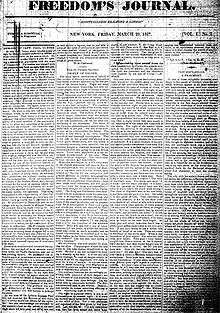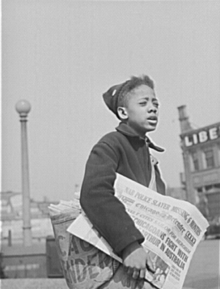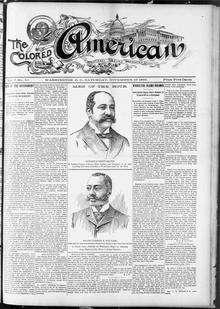African-American newspapers

African-American newspapers are newspapers in the United States that cater to primarily African-American audiences. Samuel Cornish and John Brown Russwurm started the first African-American periodical called Freedom's Journal in 1827. During the antebellum South, other African-American newspapers sprang forth, such as The North Star founded by Frederick Douglass. As African Americans moved to urban centers around the country, virtually every large city with a significant African-American population soon had newspapers directed towards African Americans. Today, these newspapers have gained audiences outside African-American circles. However, in the 21st century these papers (like newspapers of all sorts) have shut down, merged, or shrunk in response to the dominance of the Internet in terms of providing free news and information, and providing cheap advertising.[1]
History

Origins
Most of the earliest African-American publications, such as Freedom's Journal, were published in the North and then distributed, often covertly, to African Americans throughout the country.[2] Blacks' ability to establish many environments and black neighborhoods in the North led to the first wave of publications. By the 20th century, daily papers appeared in Norfolk, Chicago, Baltimore and Washington, D.C..[3]
19th century
Some notable black newspapers of the 19th century were Freedom's Journal (1827-29), the Colored American (1837–41), the North Star (1847-1860), the National Era, The Frederick Douglass Paper (1851–63), the Douglass Monthly (1859–63), and the Christian Recorder (1861-1902)[4] In the 1860s, the newspapers the Elevator and the Pacific Appeal emerged in California as a result of black participation in the Gold Rush. [5] In the late 19th century, the main reason that newspapers were created was to uplift the black community. Many black people sought to assimilate into larger society and Northern blacks felt that it was their duty to educate Southern blacks on the mores of Victorian society. Many African-American newspapers struggled to keep their circulation going due to the low rate of literacy among African Americans. Many freed African-Americans had low incomes and could not afford to purchase subscriptions but shared the publications with one another.[6]
20th Century

African-American newspapers flourished in the major cities, with publishers playing a major role in politics and business affairs. Representative leaders included Robert Sengstacke Abbott ( 1870-1940), publisher of the Chicago Defender; John Mitchell, Jr. (1863 – 1929), editor of the Richmond Planet and president of the National Afro-American Press Association; Anthony Overton (1865 – 1946), publisher of the Chicago Bee, and Robert Lee Vann (1879 – 1940), the publisher and editor of the Pittsburgh Courier.[7]
There were many specialized black publications, such as those of Marcus Garvey and John H. Johnson. These men broke a wall that let black people into society. The Roanoke Tribune was founded in 1939 by Fleming Alexander, and recently celebrated its 75th anniversary. The Minnesota Spokesman-Recorder is Minnesota's oldest Black newspaper and the United States oldest ongoing minority publication, second only to The Jewish World.
Modern Day
Many Black newspapers that began publishing in the 1960s, '70s, and '80s went out of business because they could not attract enough advertising and economic decline. They were also victims of their own substantial efforts to eradicate racism and promote civil rights. As of 2002, 200 Black newspapers remained. As of 2010, there has been a resurgence of online African-American news organizations, most notably Black Voice News, The Grio, and Black Voices. With the decline of print media and proliferation of internet access, more and more black news websites are popping up every day.
List of African-American newspapers in the United States
- African-American News and Issues – Houston, Texas
- The Afro-American Citizen - Charleston, South Carolina, 1900
- (An African American) Point of View - Springfield, Massachusetts
- The Aliened American - Cleveland, Ohio, 1852-1856, editor William H. Day [8]
- The American Baptist - Louisville, Kentucky (owned by the General Association of Baptists in Kentucky)
- The Anti-Slavery Bugle (defunct) - New Lisbon, Ohio
- The Arizona Informant - Phoenix, Arizona
- Atlanta Daily World - nation's first black-owned daily in the 20th century[9]

- Baltimore Afro-American - Baltimore, Maryland
- The Baltimore Times - Baltimore, Maryland
- Bay State Banner - Boston, Massachusetts
- Big Red News (defunct) - Brooklyn, New York
- Black Chronicle - Oklahoma City, Oklahoma
- Black News – Columbia, South Carolina (Black Media News Group)
- Boston Guardian (defunct) - Boston, Massachusetts
- Buffalo Challenger - Buffalo, New York
- The Buffalo Criterion - Buffalo, New York
- California Eagle (defunct) - Los Angeles, California (Charlotta Spears Bass, owner & publisher 1912-1951)[10]
- Call and Post - Cleveland, Ohio
- Capital Outlook - Tallahassee, Florida
- Carolina Peacemaker - Greensboro, North Carolina
- The Carolina Times - Durham, North Carolina; editor Louis Austin shaped the paper into a voice for African Americans
- The Carolinian - Raleigh, North Carolina
- Charlotte Post - Charlotte, North Carolina
- Chattanooga Courier
- Chicago Crusader - Chicago, Illinois
- Chicago Defender – Chicago
- Christian Banner[11] - Philadelphia, Pennsylvania (Nannie Helen Burroughs was associate editor in 1897.)
- The Christian Recorder
- The Chronicle Newspaper Inc. - Lansing, Michigan
- The Cincinnati Herald – Cincinnati, Ohio
- The City SunPress
- The Cleveland Gazette
- The Colored American
- The Columbus Times Newspaper
- The Community Voice - Wichita, Kansas
- The Courant
- Daily News King - Atlanta, Georgia
- Dallas Express
- The Denver Weekly News
- Douglas Monthly
- The St. Louis Evening Whirl
- The Facts – Seattle
- The Final Call
- The Florida Sentinel Bulletin - Tampa, Florida
- The Florida Star - Jacksonville, Florida

- Freedom's Journal
- Frost Illustrated - Fort Wayne, Indiana
- Gary Crusader - Gary, Indiana
- Harambee News - Los Angeles, California[12]
- Houston Forward Times - Houston, Texas
- Indianapolis Freeman (defunct)
- Indianapolis Recorder
- INK Newspaper (defunct)
- Jackson Advocate
- Kansas City Call – Kansas City, Missouri
- Kansas State Ledger
- Knoxville Enlightener
- Las Vegas Sentinel-Voice
- The Liberator
- Los Angeles Sentinel
- The Louisiana Weekly
- Louisville Defender – Louisville, Kentucky
- Memphis Tri-State Defender – Memphis, Tennessee
- The Miami Times - Miami, Florida
- Michigan Chronicle
- Milwaukee Community Journal – Milwaukee, Wisconsin
- Minnesota Spokesman-Recorder
- The Montana Plaindealer[13]
- Morningside Park Chronicle - Inglewood, California
- Muncie Times, free full-text access, 1991-2010
- Murfreesboro Vision
- Muhammad Speaks
- Muslim Journal
- The Nashville Pride
- The National Era - The District of Columbia
- New Journal and Guide
- The New Orleans Tribune - La Tribune de la Nouvelle-Orleans
- New York Amsterdam News
- New York Beacon
- New York Carib News - New York, New York
- The New York Voice (weekly)
- News Nugget - Topeka, Kansas
- North Star
- Nos Journal
- The Oakland Post - California
- Ohio State News - Columbus, Ohio (1944-1952)[14]
- Omaha Star (Mildred Brown, owner & publisher 1945-1989)
- Our Time Press - Brooklyn, New York
- Our Weekly
- Pennsylvania Freeman
- The Pensacola Voice - Pensacola, Florida
- Philadelphia Observer – Philadelphia
- Philadelphia Tribune – Philadelphia, Pennsylvania
- Pine and Palm - Boston, Massachusetts
- Pittsburgh Courier – Pittsburgh, Pennsylvania
- Point of View - Springfield, Massachusetts
- Pompano Post - Pompano Beach, Florida
- Providence Watchman - Providence, Rhode Island (Charlotta Spears Bass, employee 1894-1904)
- Richmond Free Press
- The Richmond Voice Newspaper
- Roanoke Tribune - Roanoke, Virginia
- The Sacramento Observer – Sacramento, California
- St. Louis Argus - St. Louis, Missouri
- St. Louis Sentinel – St. Louis, Missouri
- San Francisco Bay View
- Savannah Tribune – Savannah, Georgia
- The State Journal - Harrisburg, Pennsylvania, 1883-1886
- Seattle Medium – Seattle, Washington
- The Skanner - Portland, Oregon and Seattle, Washington
- South Florida Times - Miami, Ft. Lauderdale, Palm Beach, Florida
- The Topeka Plaindealer - Topeka, Kansas[15]
- Tennessee Tribune - Nashville, Tennessee
- Urban Trendsetters News Magazine - Columbus, Ohio
- The Washington Afro-American
- The Washington Bee - Washington, D.C.
- The Washington Informer
- The Washington Sun
- Weekly Advocate - New York, New York
- The Westside Gazette - Fort Lauderdale, Florida
- Wharton Elevator - Wharton Texas (published in 1897)
- Wharton Southern Monitor - Wharton, Texas (published in 1887)
- Woman's Era (U.S.), the first newspaper published by and for African-American women
List of African-American online news organizations in the United States
- Black News Portal
- Black News
- Black Voices
- BlackState
- Daily King News
- Good Black News
- The Grio
- Minnesota Spokesman-Recorder
- The MP Chronicle
- National Newspaper Publishers Association
- The Network Journal
- The Root
- The St. Louis Metro Evening Whirl
- SC Black News Group
- The Skanner
- www.theblackviewpoint.com
- Urban Lyfestyles Magazine, ULM
See also
- List of newspapers in the United States
- African American history
- African-American business history
- African-American Civil Rights Movement (1865–95)
- African-American Civil Rights Movement (1896–1954)
- African-American Civil Rights Movement (1954–68)
References
- ↑ Arvarh E. Strickland and Robert E. Weems, eds. The African American Experience: An Historiographical and Bibliographical Guide (Greenwood, 2001). pp 216-30
- ↑ Jacqueline Bacon, "The history of Freedom's Journal: A study in empowerment and community." Journal of African American History 88.1 (2003): 1-20. in JSTOR
- ↑ Jacqueline Bacon, Freedom's journal: the first African-American newspaper (2007)
- ↑ http://libguides.princeton.edu/c.php?g=84280&p=544320
- ↑ http://faculty.washington.edu/qtaylor/Courses/313_AAW/313_manual_cp_03.htm
- ↑ Rhodes, Jane (1998). Mary Ann Shadd Carry: The Black Press and Protest in the Nineteenth Century. Bloomington, In: Indiana University Press. pp. 120–123. ISBN 0-253-21350-9.
- ↑ Patrick S. Washburn, The African American Newspaper: Voice of Freedom (2006).
- ↑ Gore, Jr., George William (1922). Negro Journalism: An Essay on the History and the Present Condition of the Negro Press. Greencastle, IN: Journalism Press. p. 8.
- ↑ Business, Family (2012-01-12). ""Recap: Alexis Scott Shares Atlanta Daily World History on Family Business Radio", Family Business Radio, January 12, 2012". Familybusinessradio.com. Retrieved 2012-03-04.
- ↑ USC Digital Library,The Charlotta Bass / California Eagle Photograph Collection, http://digitallibrary.usc.edu/cdm/landingpage/collection/p15799coll102
- ↑ University of North Texas Library, http://texashistory.unt.edu/ark:/67531/metapth523592/m1/1/
- ↑ Smith, Jessie; Bracks, Lean'tin; Wynn, Linda T. (2012). The Complete Encyclopedia of African American History. Visible Ink Press. p. 541. ISBN 978-1-57859-536-5.
- ↑ Library of Congress, http://chroniclingamerica.loc.gov/lccn/sn84036199/
- ↑ "Ohio State News Collection 1944-1952". Ohio History Connection.
- ↑ Library of Congress, http://chroniclingamerica.loc.gov/lccn/sn85067152/
Further reading
- Bacon, Jacqueline. Freedom's journal: the first African-American newspaper (Lexington Books, 2007)
- Belles, A. Gilbert. "The Black Press in Illinois." Journal of the Illinois State Historical Society (1908-1984) (1975): 344-352. online
- Bradshaw, Katherine A. "Eye on the Struggle: Ethel Payne, the First Lady of the Black Press." Journalism History 41.1 (2015): 53+
- Bullock, Penelope L. The Afro-American Periodical Press, 1838-1909 (LSU Press, 1981).
- Buni, Andrew (1974). Robert L. Vann of the Pittsburgh courier: politics and Black journalism. University of Pittsburgh Press.
- Burma, John H. "An analysis of the present Negro Press." Social forces (1947): 172-180. in JSTOR
- Dann, Martin E. The Black Press, 1827-1890: The Quest for National Identity (1972).
- Davis, Ralph N. "The Negro Newspapers and the War." Sociology and Social Research 27 (1943): 378-380.
- Eldridge, Lawrence Allen. Chronicles of a Two-front War: Civil Rights and Vietnam in the African American Press (University of Missouri Press, 2012)
- Finkle, Lee. Forum for protest: The black press during World War II (Fairleigh Dickinson University Press, 1975)
- Guskin, Emily, Paul Moore, and Amy Mitchell. "African American media: Evolving in the new era." in The State of the News Media 2011 (2011).
- Henritze, Barbara K. Bibliographic Checklist of African American Newspapers (Genealogical Publishing Com, 1995)
- Hogan, Lawrence D. A black national news service: the Associated Negro Press and Claude Barnett, 1919-1945 (Fairleigh Dickinson Univ Pr, 1984)
- Jones, Allen W. "The Black Press in The" New South": Jesse C. Duke's Struggle for Justice and Equality." Journal of Negro History 64.3 (1979): 215-228. in JSTOR
- La Brie, Henry G. A survey of Black newspapers in America (Mercer House Press, 1973.
- Meier, August. "Booker T. Washington and the Negro Press: With Special Reference to the Colored American Magazine." Journal of Negro History (1953): 67-90. in JSTOR
- Morris, James McGrath. Eye on the Struggle: Ethel Payne, the First Lady of the Black Press (New York: Amistad, 2015). xii, 466 pp.
- Oak, Vishnu Vitthal. The Negro Newspaper (Greenwood, 1970)
- Odum-Hinmon, Maria E. "The Cautious Crusader: How the Atlanta Daily World Covered the Struggle for African American Rights from 1945 to 1985." (PhD Dissertation University of Maryland, 2005). online
- Pride, Armistead Scott, and Clint C. Wilson. A history of the Black press (Howard University Press, 1997).
- Simmons, Charles A. The African American press: a history of news coverage during national crises, with special reference to four black newspapers, 1827-1965 (McFarland, 2006).
- Stevens, John D. "Conflict-cooperation content in 14 Black newspapers." Journalism Quarterly 47#3 (1970): 566-568.
- Strickland, Arvarh E., and Robert E. Weems, eds. The African American Experience: An Historiographical and Bibliographical Guide (Greenwood, 2001). pp 216–30, with long bibliography
- Suggs, Henry Lewis, ed. The Black press in the south, 1865-1979 (Praeger, 1983).
- Suggs, Henry Lewis, ed. The Black Press in the Middle West, 1865-1985 (Greenwood Press, 1996). 416 pp.
- Wade-Gayles, Gloria. "Black Women Journalists in the South, 1880-1905: An Approach to the Study of Black Women's History." Callaloo 11/13 (1981): 138-152. in JSTOR
- Washburn, Patrick S. The African American Newspaper: Voice of Freedom (Northwestern University Press, 2006); covers 1827-1900; emphasis on Pittsburgh Courier and the Chicago Defender
- Washburn, Patrick Scott. A question of sedition: The federal government's investigation of the black press during World War II (Oxford University Press, 1986).
- Wolseley, Roland Edgar. The black press, USA (Wiley-Blackwell, 1990).
Primary sources
- Dunnigan, Alice. Alone Atop the Hill: The Autobiography of Alice Dunnigan, Pioneer of the National Black Press (University of Georgia Press, 2015)
External links
- List of black-owned newspapers in the United States
- African American Newspapers: The 19th Century (full-text index of 17 titles)
- African-American Newspapers 1829 to present
- Black Press USA: List of local newspapers